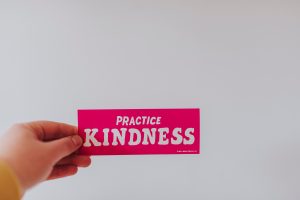[vc_row][vc_column][vc_column_text][printfriendly]
The 5 D’s Of Eating
By Kaela Scott

Sometimes I think the longer I work in eating disorders the more I continue to be surprised by just how complicated out relationship with food, and therefore ourselves, really can be. There are so many different roles food plays in our lives and different ways in which we relate to food. Often when someone struggles with disordered eating or an eating disorder, they are blind to the different ways in which they engage with food that may be sabotaging them. Below are the 5 D’s of eating. Underneath all of these is usually an individual who has either long neglected their real need, or is more accustomed to being cruel to themselves than kind.
[dt_quote type=”pullquote” layout=”right” font_size=”big” animation=”none” size=”18″]Underneath all of these is usually an individual who has either long neglected their real need, or is more accustomed to being cruel to themselves than kind. [/dt_quote]
Is there any one of these that stands out the most to you?
- Defiant Eating: This is also known as “screw you” eating/restricting or eating/restricting that you do in an attempt to defy someone who you feel is trying to control your relationship with food. If you do this kind of eating you want to spend some time thinking about who your food police are (mom, boyfriend, friend, husband, sister etc) and ask yourself if you want to keep hurting yourself instead of setting a boundary with them.
- Denied Eating: When you tell yourself you are attending to your food intake but “forget” what you eat in the car, as you scrape the dishes, sampling stuff, finishing your kids plates, standing at the fridge etc. Or, on the flip side, when you tell yourself you attend to your food take but accidently “forget” to finish your snack, or leave your lunch at home, or get busy and forget to eat. People who struggle with this type of eating typically say that regardless of how hard they try nothing ever changes or will blame it on circumstances they feel are out of their control. In this situation, you want to try to be as honest with yourself as possible and try to decide if you’re going to focus on your recovery or on the things you do that prevent your recovery.
- Dissociative Eating: When you eat and have no idea you are doing it and “wake up” the next day only to see wrappers etc around that you don’t know how they got there. For individuals who restrict, they can feel incredibly alarmed by how their body took over and how they engaged in nourishing their body without feeling like they were the one making the decision.
- Deserved Eating: Feeling you deserve to “reward” yourself with food. For example, telling yourself it has been a really long week I deserve to have all my favorite treat foods on Friday night. Alternatively, if you restrict it can be about telling yourself that you have to earn your right to have food. For example, if I accomplish X,Y, and Z I can have a snack. You want to try to get out of this form of thinking as soon as possible. Food is not something you deserve or earn, it is something you need in order to survive and take care of yourself.
- Depleted Eating: This happens when you use food to restore yourself after giving too much to others and not leaving anything for yourself. Typically food is used to numb the feelings you don’t feel you have the space or energy to feel. In this circumstance, if you don’t take yourself seriously and make yourself a priority, this pattern will continue. Increase your self care and be sure to invest some time into your needs each and every day.
[/vc_column_text][/vc_column][/vc_row][vc_row][vc_column][vc_column_text]
[/vc_column_text][/vc_column][/vc_row][vc_row][vc_column][vc_column_text]
[dt_divider style=”thin” /]
 Kaela Scott is a Registered Clinical Counsellor who specializes in Eating Disorders. She runs her own private practice and works with the Looking Glass Foundation in both their summer camp and their Hand In Hand Program. She has been passionate about working with eating disorders since freeing herself from her own struggle and realizing what it is like to be happy and well. When she isn’t working, you can find Kaela either cozying up with a cup of tea and her friends or up in the mountains going for a hike.
Kaela Scott is a Registered Clinical Counsellor who specializes in Eating Disorders. She runs her own private practice and works with the Looking Glass Foundation in both their summer camp and their Hand In Hand Program. She has been passionate about working with eating disorders since freeing herself from her own struggle and realizing what it is like to be happy and well. When she isn’t working, you can find Kaela either cozying up with a cup of tea and her friends or up in the mountains going for a hike.
[/vc_column_text][/vc_column][/vc_row]

 Kaela Scott is a Registered Clinical Counsellor who specializes in Eating Disorders. She runs her own private practice and works with the Looking Glass Foundation in both their summer camp and their Hand In Hand Program. She has been passionate about working with eating disorders since freeing herself from her own struggle and realizing what it is like to be happy and well. When she isn’t working, you can find Kaela either cozying up with a cup of tea and her friends or up in the mountains going for a hike.
Kaela Scott is a Registered Clinical Counsellor who specializes in Eating Disorders. She runs her own private practice and works with the Looking Glass Foundation in both their summer camp and their Hand In Hand Program. She has been passionate about working with eating disorders since freeing herself from her own struggle and realizing what it is like to be happy and well. When she isn’t working, you can find Kaela either cozying up with a cup of tea and her friends or up in the mountains going for a hike.